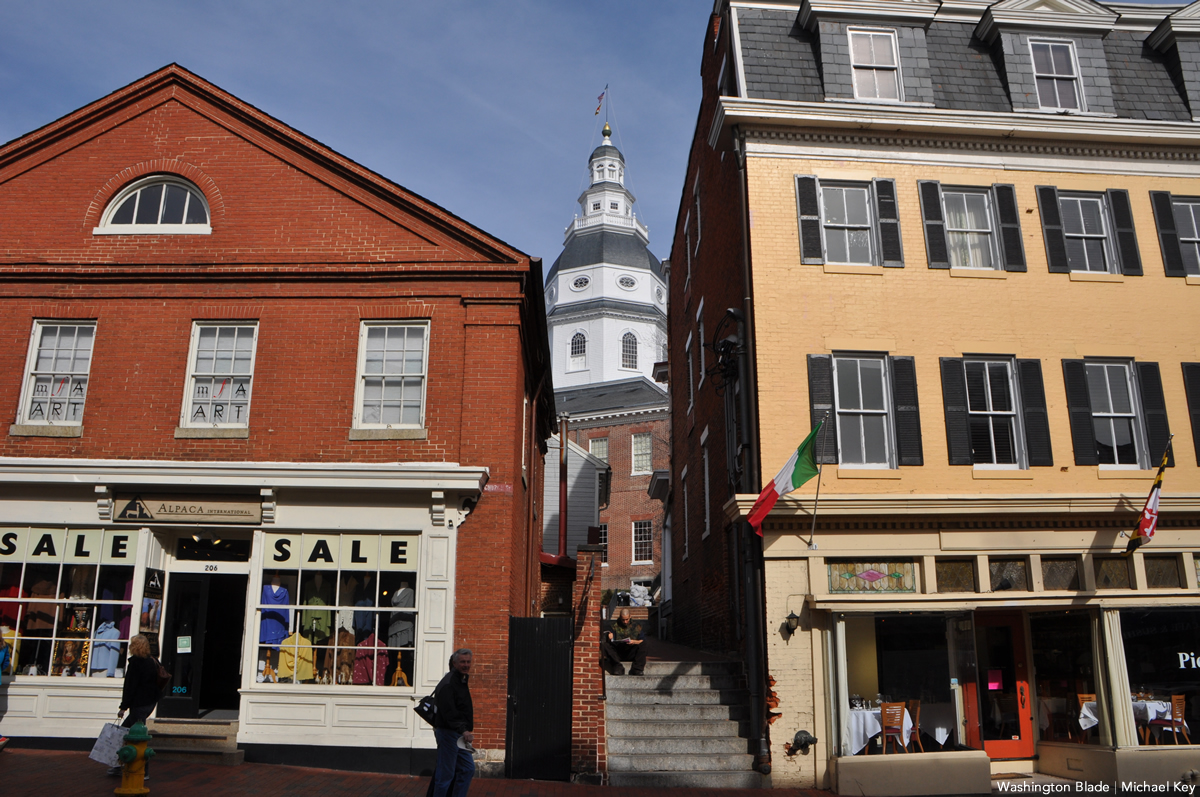Maryland
Md. could become next state to pass trans sanctuary law
Senate Finance Committee heard bill on Thursday

BY ERIN REED | On Thursday, Maryland’s Senate Finance Committee heard Senate Bill 119, a bill that would make Maryland a sanctuary state for transgender individuals and providers fleeing other states.
The bill would add gender-affirming care to a law passed last year that shields abortion patients and providers from out-of-state prosecution and investigations. Many more individuals testified in favor of the bill than against it, including Maryland state government officials who remarked on its necessity.
If passed, the law would make Maryland the 12th state, not counting D.C., to do so.
The bill includes several protections for trans individuals. It would block the enforcement of out-of-state subpoenas for medical records and information on trans patients who seek care within Maryland’s jurisdiction.
It would also prevent foreign financial judgments from other states attempting to sue Maryland providers. It would prohibit liability insurers from taking adverse action against healthcare providers for providing gender affirming care.
Additionally, it would block the extradition of individuals who have received gender-affirming care in Maryland. Lastly, it specifies that the state cannot use state funds to provide “information, spend time or money, or use state facilities, state property, state equipment, state personnel or other state resource” in aiding investigations around gender affirming care — a virtually total barring of any enforcement of anti-trans laws in the state.
The state joined several others in providing protections for patients and providers when Gov. Wes Moore signed an executive order in June to enact many of these policies. Heather Forsyth spoke on behalf of the office of the Maryland Attorney General in favor of the bill at the hearing, stating that this bill would go farther than that executive order: “It’s both critical and urgent … The executive order provided some protections, but it couldn’t offer many of the protections this legislation would provide.”

Among the things she stated this bill would do beyond Moore’s executive order:
- It would prevent liability insurance from taking adverse action on providers for providing gender affirming care.
- It would ensure license and regulatory boards could not take adverse actions for providing gender affirming care.
- It would place limits on subpoenas, wire tapping, ex parte and foreign judgments that target care provided within the state of Maryland
- It would go into law and protect transgender people regardless of who holds the governor’s office.
Forsyth was not the only one to speak on behalf of the bill from the Maryland executive branch. Ryan Moran, representing the Maryland Department of Health, also testified to the importance of the bill, emphasizing that “Maryland remains a leader in supporting trans people’s rights to equitable healthcare and safety.” Moran highlighted the growing list of Republican states banning gender-affirming care as a reason for the bill’s necessity: “These list of states are growing … the states include criminal penalties against health officials providing gender-affirming care.”
The hearing also saw testimony from representatives of large hospitals and medical associations. Michael Huber, representing Johns Hopkins University and School of Medicine, asserted that gender-affirming care is “medically necessary, lifesaving, evidence-based and age-appropriate healthcare.”
Pam Kasemeyer, testifying on behalf of the state medical society, the Academy of Pediatrics, the Mid-Atlantic Community Health Centers, and the American College of Obstetricians and Gynecologists, stated that the bill was needed due to “legal challenges and fear” from out-of-state actors targeting care in the state.
These challenges and investigations are indeed unfolding. Recently, Attorney General Ken Paxton made national headlines by subpoenaing the medical records of patients who traveled from Texas to Seattle Children’s Hospital for gender-affirming care. Similar subpoenas have been issued to gender-affirming care clinics in other states.
Meanwhile, 19 Republican state attorneys general have signed a letter asserting their right to medical information from other states, indicating that this tactic may be employed against both transgender individuals and those seeking and providing abortions moving forward.
Only a three people testified against the bill — one concerned citizen, a representative from the Maryland Family Institute, a religious organization, and Health Choice Maryland, an anti-vax organization.
The bill will need to pass a committee vote before moving to the full Senate floor in the coming days.
****************************************************************************
Erin Reed is a transgender woman (she/her pronouns) and researcher who tracks anti-LGBTQ+ legislation around the world and helps people become better advocates for their queer family, friends, colleagues and community. Reed also is a social media consultant and public speaker.
Follow her on X (Link)
******************************************************************************************
The preceding article was first published at Erin In The Morning and is republished with permission.
Maryland
4th Circuit dismisses lawsuit against Montgomery County schools’ pronoun policy
Substitute teacher Kimberly Polk challenged regulation in 2024

A federal appeals court has ruled Montgomery County Public Schools did not violate a substitute teacher’s constitutional rights when it required her to use students’ preferred pronouns in the classroom.
The 4th U.S. Circuit Court of Appeals in a 2-1 decision it released on Jan. 28 ruled against Kimberly Polk.
The policy states that “all students have the right to be referred to by their identified name and/or pronoun.”
“School staff members should address students by the name and pronoun corresponding to the gender identity that is consistently asserted at school,” it reads. “Students are not required to change their permanent student records as described in the next section (e.g., obtain a court-ordered name and/or new birth certificate) as a prerequisite to being addressed by the name and pronoun that corresponds to their identified name. To the extent possible, and consistent with these guidelines, school personnel will make efforts to maintain the confidentiality of the student’s transgender status.”
The Washington Post reported Polk, who became a substitute teacher in Montgomery County in 2021, in November 2022 requested a “religious accommodation, claiming that the policy went against her ‘sincerely held religious beliefs,’ which are ‘based on her understanding of her Christian religion and the Holy Bible.’”
U.S. District Judge Deborah Boardman in January 2025 dismissed Polk’s lawsuit that she filed in federal court in Beltsville. Polk appealed the decision to the 4th Circuit.

By PAMELA WOOD | Dan Cox, a Republican who was resoundingly defeated by Democratic Gov. Wes Moore four years ago, has filed to run for governor again this year.
Cox’s candidacy was posted on the Maryland elections board website Friday; he did not immediately respond to an interview request.
Cox listed Rob Krop as his running mate for lieutenant governor.
The rest of this article can be found on the Baltimore Banner’s website.
Maryland
Expanded PrEP access among FreeState Justice’s 2026 legislative priorities
Maryland General Assembly opened on Jan. 14

FreeState Justice this week spoke with the Washington Blade about their priorities during this year’s legislative session in Annapolis that began on Jan. 14.
Ronnie L. Taylor, the group’s community director, on Wednesday said the organization continues to fight against discrimination against people with HIV/AIDS. FreeState Justice is specifically championing a bill in the General Assembly that would expand access to PrEP in Maryland.
Taylor said FreeState Justice is working with state Del. Ashanti Martinez (D-Prince George’s County) and state Sen. Clarence Lam (D-Arundel and Howard Counties) on a bill that would expand the “scope of practice for pharmacists in Maryland to distribute PrEP.” The measure does not have a title or a number, but FreeState Justice expects it will have both in the coming weeks.
FreeState Justice has long been involved in the fight to end the criminalization of HIV in the state.
Governor Wes Moore last year signed House Bill 39, which decriminalized HIV in Maryland.
The bill — the Carlton R. Smith Jr. HIV Modernization Act — is named after Carlton Smith, a long-time LGBTQ activist known as the “mayor” of Baltimore’s Mount Vernon neighborhood who died in 2024. FreeState Justice said Marylanders prosecuted under Maryland Health-General Code § 18-601.1 have already seen their convictions expunged.
Taylor said FreeState Justice will continue to “oppose anti anti-LGBTQ legislation” in the General Assembly. Their website later this week will publish a bill tracker.
The General Assembly’s legislative session is expected to end on April 13.


















